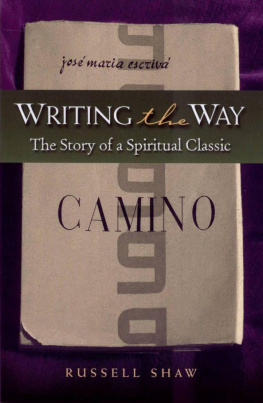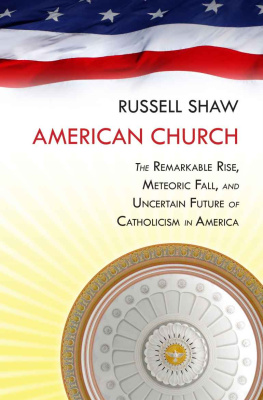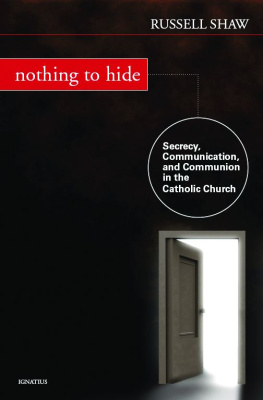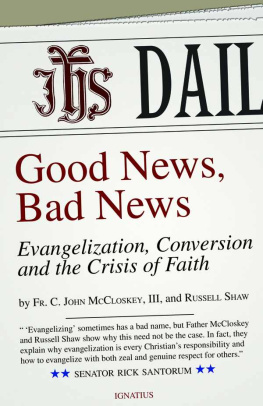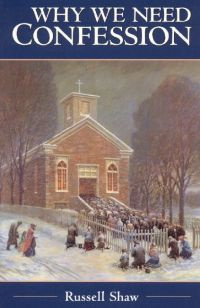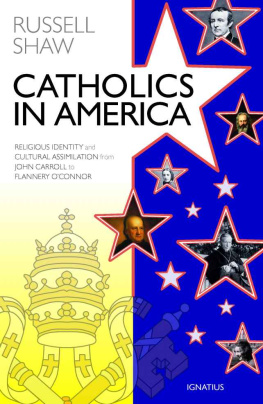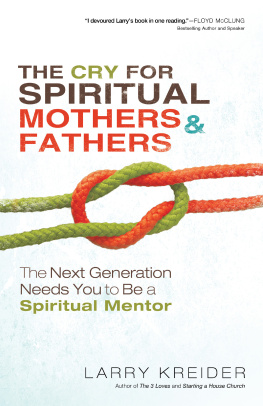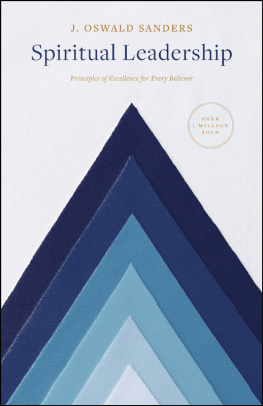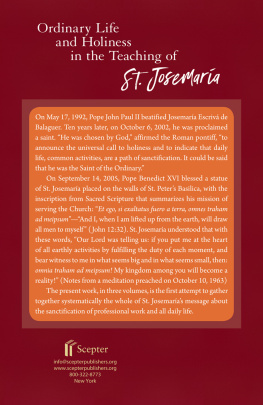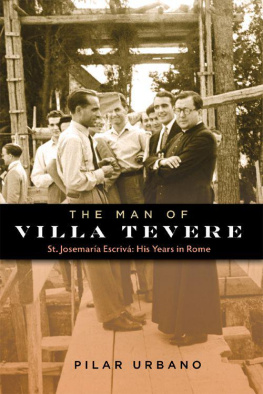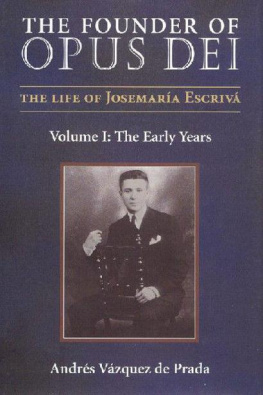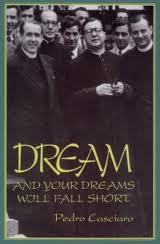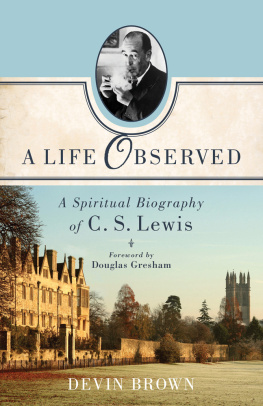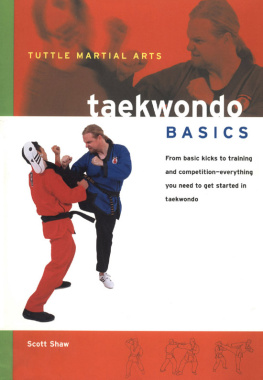

by RUSSELL SHAW

Copyright 2010, Russell Shaw
The total or partial reproduction of this book is not permitted, nor its informatic treatment, or the transmission of any form or by any means, either electronic, mechanic, photocopy or other methods, without the prior written permission of the owners of the copyright.
Copyright 2010, Scepter Publishers, Inc.
P.O. Box 211, New York, N.Y. 10018
www.scepterpublishers.org
Printed in the United States of America
ISBN-13: 978-1-59417-136-9
CONTENTS
BOOKS OF FIRE
I know how little virtue and knowledge I have, but I would still like to write books of fire.
This is St. Josemara Escriv speaking. Its August 7, 1931, and the Spanish priest is twenty-nine years old. Three years earlier hed founded Opus Dei, but hardly anybody has heard of it yet. As a matter of fact, hardly anybody has heard of Josemara Escriv yet. In time that will change.
Books of fire, he explains in his Intimate Notes, are books that can race across the world like burning flames and set people ablaze with their light and heat, turning poor hearts into red-hot coals to be offered to Jesus as rubies for his royal crown. Heres a typically impassioned expression of St. Josemaras supreme ambition: he wants to do something really greatfor Christ and for the men and women with whom he yearns to share his fierce love of God.
When the time comes, though, he wont see The Way the book that is to be his most popular and influential literary effortas the sort of book to accomplish that. Its aims will be too modest, its origins too humble, to meet the standards of a book of fire. At best, hell suppose when its published in 1939, it may sell a few thousand copies.
Which is additional evidence that people who want to make God laugh need only tell him their plans.
W HY T HIS B OOK ?
Why write a book about St. Josemaras book? Thats easy.
The Way is a small volume, often published in a pocket-and purse-sized format intended for people who dont have a lot of spare time and want to make good use of the time they have, even in circumstancesa bus or subway ride, a wait in an airportthat may not look very prayer-friendly. The book consists of 999 short pointsa few sentences or a couple of paragraphs at mostwhich are meant to serve as starting points for meditation and personal prayer.
Its no surprise that the faithful of Opus Dei, the predominantly lay group St. Josemara launched in 1928 to promote sanctity in everyday life, should cherish The Way . Yet the author made it clear that it wasnt written only for us. Rather, he attempted to write it in such a way that it would speak to anyone with a serious interest in the interior life, even making changes in his preliminary notes with that aim in view. Apparently he succeeded. Although as of 2009, when this is being written, the members of the Work (or, to be more formal, the faithful of the Opus Dei prelature) number only about 87,000 worldwide, sales of The Way in the first seventy years since its publication exceeded 4.5 million and it has been translated into forty-three languages.
Since it first appeared, just after the Spanish civil war, the book has touched and changed the lives of countless readers and been hailed as a modern spiritual classic. For thousands of people today its a well-loved companion and guide in their efforts to build up and sustain friendship with Christ. A book like that deserves a closer lookto learn how it came to be written and, to the extent possible when discussing the operation of grace, to find the explanation of its perennial appeal to so many persons of such diverse nationalities and backgrounds.
The Way also deserves our attention for another reason.
Many books lack personality. For all the flavor and individuality they have, they might have been written by literate robots. Bookstores and libraries are full of such books. But The Way has vitality, character, a distinctive voice. One might say of it what the historian Henri Daniel-Rops says of the letters of St. Paul: while the author has obvious literary skills, the real strength of his writing is that hes not a writer first of all, but a man, whose words arent products of a mind securely sheltered in a library, but of a conqueror, a fighter, whose whole life was risk.
St. Josemaras voice can be heard in the authors preface to The Way , speaking to the reader in affectionate, intimate terms.
Read these counsels slowly.Pause to meditate on these thoughts.They are things that I whisper in your earconfiding themas a friend, as a brother, as a father.And they are being heard by God.I wont tell you anything new.I will only stir your memory,so that some thought will ariseand strike you;and so you will better your lifeand set out along ways of prayer and of love.And in the end you will bea more worthy soul.
These few lines sum up St. Josemaras aims in writing. He writes as a friend: because he tells readers what he thinks they need to hear, with empathy but also with unflinching candor. He writes as a brother: because he is intensely conscious that he is a child of Goddivine filiation, he calls itand urgently desires that others, too, be aware of themselves as Gods children; and because, precisely as Gods children, all of us are members of the same family, the family of God, and therefore, in Christ, sisters and brothers to one another. And he writes as a father: because above everything else he wants us to grow up, to mature in divine filiation, and become saints.
But, someone might ask, why that reference to things that I whisper in your ear? If what the author has to say is really so important, why doesnt he shout? The answer, I think, is that The Way embodies the principle of cor ad cor loquitur , heart speaking to heart, which John Henry Newman took for his motto as a cardinal. This intimate discoursespiritual direction, to give it its usual namedoesnt occur by shouting; its conducted with that moral refinement of which discretion, confidence, and respect for the other are essential features.
The Way , then, is a book brimming with something St. Josemara understood, prized, and wrote about vividly: heart. Youre afraid of becoming distant and cold with everyoneyou want so much to be detached! Get rid of that fear. If you belong to Christcompletely to Christhe will give you fire, light and warmth for all men ( The Way , no. 154). To read St. Josemaras book thoughtfully and prayerfully is to enter into conversation with the man who wrote it. But as he wished, its also, and especially, to enter into conversation with Christ. And finally to give Christ your heart.
T HE U NIVERSAL C ALL
The fundamental idea underlying The Way was revolutionary when it came out. In many respects, its revolutionary even now. Although the idea has been part of the authoritative teaching of the Catholic Church at the highest level ever since the Second Vatican Council of 19621965, it remains far from being heeded and taken seriously by all Catholics.
The idea is that holiness is for everyone, including ordinary Christians who live in the secular world and there carry out their responsibilities as spouses and parents, workers and professional people, students, citizens, neighbors, friends, and members of the Church. This is the universal call to holiness.
In modern times, this idea of a universal call is, as a practical matter, new. For centuries it was commonly supposed that holiness was the business of priests and nuns. The rest were expected to perform their duties of state and to avoid serious sin; and in this way they could expect eventually to reach heaven. But sanctity, the holiness of saints, was beyond the reach of most laity.
Next page
